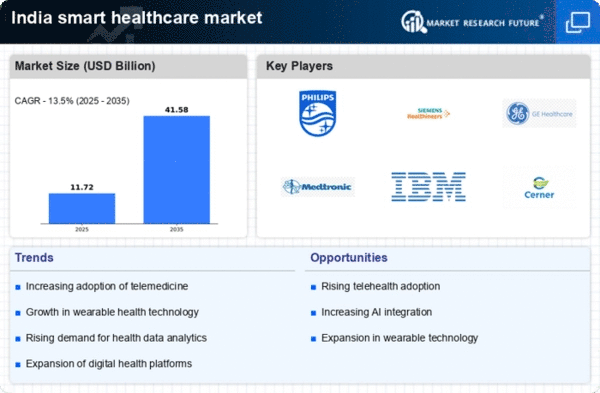Integration of IoT in Healthcare
The integration of Internet of Things (IoT) technology into healthcare systems is transforming the smart healthcare market in India. IoT devices facilitate seamless communication between patients and healthcare providers, enabling real-time data exchange and improved decision-making. The market for IoT in healthcare is expected to reach approximately $6 billion by 2026, reflecting a robust growth trajectory. This integration enhances operational efficiency, reduces costs, and improves patient outcomes. As healthcare providers increasingly adopt IoT solutions, the smart healthcare market is likely to experience significant expansion.
Government Initiatives and Support
Government initiatives play a crucial role in propelling the smart healthcare market in India. The Indian government has launched various programs aimed at digitizing healthcare services, such as the National Digital Health Mission. These initiatives are designed to improve healthcare accessibility and efficiency through technology. Financial investments in health tech startups and infrastructure development are also on the rise, with the government allocating over $1 billion to enhance digital health services. Such support fosters innovation and encourages the adoption of smart healthcare solutions, ultimately contributing to the market's growth.
Advancements in Data Analytics and AI
Advancements in data analytics and artificial intelligence (AI) are significantly influencing the smart healthcare market in India. These technologies enable healthcare providers to analyze vast amounts of patient data, leading to improved diagnostics and treatment plans. The AI market in healthcare is projected to grow at a CAGR of around 40% over the next few years, indicating a strong trend towards data-driven decision-making. By leveraging AI and analytics, healthcare organizations can enhance operational efficiency and patient care, thereby driving the growth of the smart healthcare market.
Growing Health Awareness Among Consumers
An increasing awareness of health and wellness among consumers is driving the smart healthcare market in India. As individuals become more proactive about their health, there is a rising demand for smart health solutions that provide personalized care and monitoring. This trend is evident in the growing popularity of health apps and wearable devices, which empower users to track their fitness and health metrics. Market Research Future indicates that the health app segment is expected to grow by over 30% in the coming years. This heightened consumer awareness is likely to stimulate further innovation and investment in the smart healthcare market.
Rising Demand for Remote Patient Monitoring
The increasing demand for remote patient monitoring is a pivotal driver for the smart healthcare market in India. With a growing population and a surge in chronic diseases, healthcare providers are seeking innovative solutions to manage patient care effectively. Remote monitoring technologies enable healthcare professionals to track patients' health metrics in real-time, reducing the need for frequent hospital visits. According to recent estimates, the remote patient monitoring segment is projected to grow at a CAGR of approximately 25% over the next five years. This trend not only enhances patient engagement but also optimizes resource allocation within healthcare facilities, thereby driving the smart healthcare market.
















